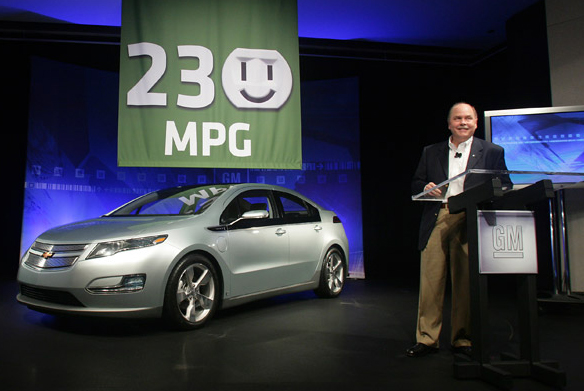The Crank: Did GM “lie” about its Chevy Volt being an “electric” car?
Its General Motors' so-called Jesus (as in savior) Car. And it's being rolled out in its home U.S. market right now, before it makes its way to Canada next year. Yet, in what should be a shining moment in the sun for one of the most talked about new cars in some time, parent GM is having to defend not only its Chevrolet Volt’s less-than-promised real-world fuel economy, but also if the car is really the revolutionary vehicle GM’s been promising us since its debut at the 2007 Detroit show. First things first: Based on the on-road evaluations from reputable U.S. pubs like Popular Mechanics (they got 37.5 mpg), Car and Driver (“a carefully modulated cruise below 60 mph pushed the figure into the upper 30s.") and Motor Trend (“should return fuel economy in the high 30s to low 40s.") are reporting, the Volt isn’t exactly getting the 230 MPG city fuel consumption GM promised back in August of last year For some context, a $23,875 2011 Volkswagen Jetta diesel (with one more seat than the four-place, $41,000 USD) sips in that range. Mileage numbers may not in the end affect Volt sales. Like the Toyota Prius—which rarely achieves its fuel economy ratings—many buyers will be gob smacked by the Volt’s revolutionary mechanical makeup. But the second battle GM’s PR folks are battling now deals with the Volt's alleged status as a "pure" EV, and the company’s credibility—or precived lack thereof—is on the line. Here’s the skinny: As GM has said for three years, the Volt is an electric-vehicle, an EV. It would always run on electric power, that the car is an “extended-range electric vehicle”, not a hybrid like the Prius. Or is it… During these U.S. media drives events, Edmunds.com, Motor Trend and Popular Mechanics have reported that during heavy acceleration the Volt uses its gasoline engine to power an electric generator which helps turn the wheels, not just juice its battery pack, as GM has stated all along —i.e. just like a run-of-the-mill gas-electric hybrid. Hmmm…not as sexy, eh? So now GM is saying that, yes, the Volt’s gas engine does assist in driving the car through an electric generator. Which, one could argue with GM and say, effectively, makes the Volt a plug-in hybrid and not the electric vehicle GM has pimped the car out as for years. Apparently, GM’s defense is that they didn’t want all of the Volt’s details to be released for fear its patents would be copied. Lame? Maybe. But in the end, do you care if the Volt is a plug-in hybrid or an EV? As a taxpayer you should. You see, last year, the Ontario government (a part owner in GM) announced that it would offer a $10,000 rebate on the Volt, because it’s an EV. But now that the Volt apparently isn’t a “pure” EV, does it still qualify for the rebate? If so, shouldn't hybrids from Ford, Nissan, Honda and Toyota get rebates as well? Or do you only care that when the Volt is running on electric power only—which now GM says is about “25 to 50 miles”— that it’s a cleaner alternative to a gas-only car? [Sources: Automotive News, Car and Driver, Edmunds, Motor Trend, Popular Mechanics]10.12.10 | 2010, 2011, Chevrolet, News, Stuff | Comments Off on The Crank: Did GM “lie” about its Chevy Volt being an “electric” car?





